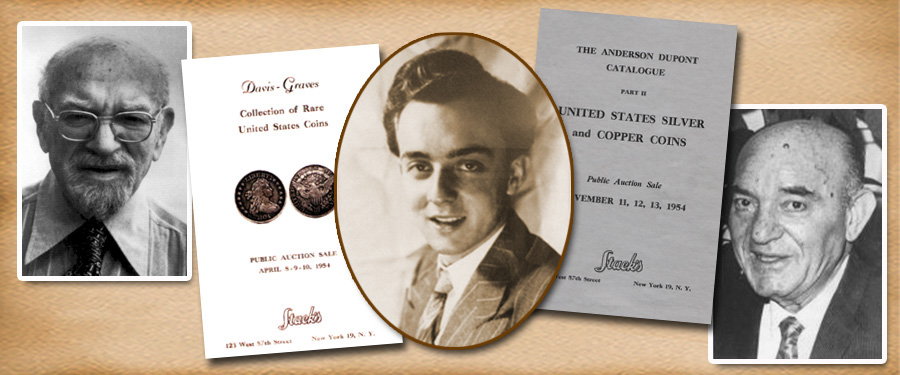
Despite the economic upheaval in 1981 and earlier years, the numismatic market seemed to withstand the uncertainties created by the sharp drop in silver on the precious metals market. While for a few years shows and conventions and the media were dominated by speculation in silver, most numismatic collectors and professional dealers who focused on the wide range of the hobby continued on as they had before this precious metals bubble. And while, of course, these people saw some losses when the silver bubble popped, they were small relative to those suffered by the speculators. Those dedicated to building collections of rare and important coins over a period of time found that their collectibles for the most part retained over 90% of their value.
We at Stack’s continued our retail business, adjusted our retail and buying prices accordingly, and maintained our personal relationships with collectors. As mentioned earlier, New York City was a hub for collectors, as there were so many in the New England area, New York City, and Pennsylvania who visited with us at our shop. These dedicated collectors bought and sold as they did in previous years, and we were indeed fortunate to have so many who visited us often. While we had lost Uncle Joe and my father, Morton, the family was still very much committed to our business, with myself, my son Larry, and my cousin Norman serving our clients, along with a number of fine numismatists who came to work with us in the store, traveled with us to conventions and to visit clients. In addition, my daughter Susan came to work with us after she finished college, focusing on bookkeeping and eventually becoming the office manager.
One of the problems the hobby was still struggling with was counterfeit, doctored, refurbished and polished coins. All dealers had to contend with this problem and Stack’s was no exception. As I discussed earlier, ANACS had been established by the American Numismatic Association to grade and authenticate coins. While this provided some relief, it wasn’t long before unethical people in the hobby found ways to work around this new system and abuse it to make a profit. As always, our role as professional numismatists was to help our customers avoid being the victims of such scams. Unfortunately, not everyone appreciated how important it was to buy and sell with a reputable dealer in order to protect themselves against this kind of fraud. Although the PNG and other hobby groups, along with the government, worked to fix the counterfeiting problem, it would continue for years to come.
For Stack’s, 1982 was a record breaking year for Public Auction sales, as we were fortunate to be able to offer a number of collections built in the decades earlier. The pedigrees from some of these sales continue to be cherished in the 21st century, as they were by the buyers in 1982. These important collections were featured in elaborate catalogs, with color illustrations of many of the rarities.
Our first sale for 1982 was the landmark offering of The Robison Collection of United States Coins and Colonial Coins. This collection was started in the 1950s and was primarily formed by Ellis Robison (known to his friends as Roby) and his wife, Doris. Professionally Roby was one of the largest pharmaceutical dealers in the northeast and lived in Troy , New York. As related in my story of 1979 when we offered the Robison collection of gold coins, Roby and Doris were very interested in higher education and the sports programs at various colleges. They donated the funds raised by the sale of their impressive collections to the various universities they supported. Roby graduated from Cornell University in 1927 and became a major benefactor to that institution as well as other schools.
Stack’s had served the Robisons for decades, finding the coins needed for the collections, and we were fortunate to be awarded the consignments for auction. Roby’s desire was to gather as complete a collection of United States coins as he could and while that goal was not totally achieved, his was among the major "almost complete" cabinets formed in the 20th century.
The February 1982 sale of over 2,000 lots started with an extensive collection of colonial coins, followed by nearly complete runs of all issues from half cents to dollars. The rarities included are too numerous to list. The proceeds from the sale, about $4 million, went to Cornell University, Rensselaer Polytech, Russell Sage College and Brown University. It was a great way to start off the 1982 auction season, and we were pleased to know there were quite a few more fine sales to come.





